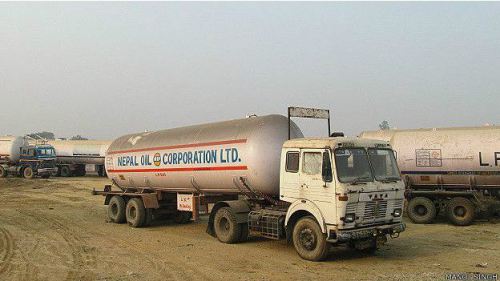Indian government has been saying, even stressing continuously that it has not imposed any blockade on Nepal. But Nepal is suffering due to lack of cooking gas, petrol, medicines and other items of daily need.
Just visiting the border town of Sunauli (Sonauli) is enough to expose the carefully drafted statements of External Affairs Minister Sushma Swaraj.
In reality this is a controlled blockade, whose remote controller rests at the hands of someone higher up. On the ground here, many games are being played out in that pretext.
Minister Swaraj told the parliament that trucks leaving India have been stopped by Nepal’s Madhesi protestors.
[Related article: Debunking Dr. Karan Singh’s Misinformed Comments on #Nepal at Indian Rajya Sabha]
Although there’s no protest in Sunauli, only a fixed number trucks are allowed to pass every two-three days. The trucks with Nepal’s imports are lined up for more than 14 kilometres on the Indian side and reach much further than the town of Nautanwa. However, buses and other vehicles are passing the border from both sides as usual.
So why are the trucks stopped? To this and every other question, the officers from customs and border security force (SSB) respond that all is because of orders from above.
Whose orders from higher up? They respond to this question with such a laughter, which means- “are you so innocent as to not know what even a five-year-old kid in Nepal knows?”
Cross the border and ask the same question on the Nepali side. It elicits a stunning question, “what kind of neighbors are you?”, as if this journalist is representing the Indian government.
Then they say, “no sooner had we made our constitution, than you started to demand an amendment. When we refused, why did you stop our bread and butter?”
Custom officials claim that these days about 100 trucks are allowed to pass after inspection. But there are several details that go into determining the trucks that will be allowed to enter Nepal.
In Kolhui and Nautanhwa of the Maharajgunj district on the Indian side, LPG (cooking gas) trucks of Nepali and Indian oil corporations have been separated from the long queue of trucks and parked on nearby fields.
Trucks carrying medicines are prioritized and allowed to pass, but police stop trucks carrying petrol, diesel and cooking gas. Trucks carrying marble stones, cars and bikes are also being allowed to pass.
The biggest difficulty Nepal is facing is of fuel. And those who come to enjoy the spectacle of trucks queuing on the highway also admit that India wants to bring Nepal down to its knees by shutting down fuel and transportation.
Truck drivers say, police take bribes to select and allow trucks from among the long queue that has been standing for two months. The rates are INR 300 for normal trucks, 500 for big trucks, and more for containers. This is because the importing company in Nepal faces a loss of about INR 13,000 for every additional day a container is standing on the queue.
Is is estimated that goods worth INR 20 billion are queued up on the Indian side on the road of Sunauli border and Nautanhwa railway station.
There are attempts to unload goods from the trucks to smaller vehicles and carts in order to take them across the border.
Nepal’s businesses and factories are cancelling their orders because no-one knows when the blockade will end.
When asked about corruption, the police reply that the accusations are unsubstantiated.
The police say, “Our officers are getting calls from ministers and big politicians in the state of UP and the center. They ask us to allow trucks belonging to certain industrialists. When we allow such trucks to get out of the queue and pass because of our officers’ orders, we face these accusations.”
(Translation of a report by senior journalist Anil Yadav, first published in BBC Hindi. You can read the original report here. A Nepali translation of the report is available on the BBC Nepali website.)
Translated by nepalforeignaffairs.com team.




